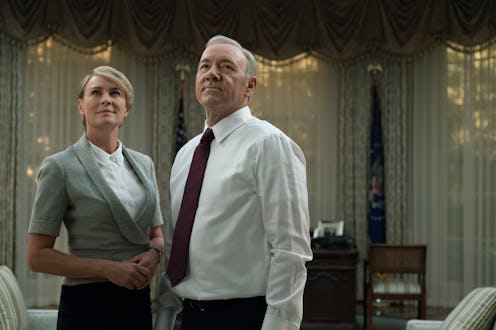Entertainment
'House Of Cards' Gives Fans An Electoral Civics Lesson

After four thrilling seasons of House Of Cards, the Underwoods are well-known for their complicated political scheming. That's how Frank and Claire ended up as the Presidential and Vice Presidential picks for the Democratic party last year, respectively. (Spoilers for Season 5 of House Of Cards ahead!) As of Season 5, their subterfuge has lead to circumstances so dire that Congress has elected them to the White House without the electoral college — which led to separate votes within the House and the Senate. But is the drama that House Of Cards depicts actually possible? Can a split ticket really happen in a presidential election?
Nowadays, candidates for president and vice president appear on the same ticket, but this wasn’t always the case. Hamilton fans are no doubt aware that during the first decade of American democracy, the runner-up who received the second highest number of electoral votes became vice president; so in the Election of 1800, Aaron Burr became Thomas Jefferson’s vice president despite openly campaigning against him.
However, the situation was actually a lot more complicated than your favorite musical would suggest. As Smithsonian Magazine notes, at the time electors voted for their top two choices of candidates, with the assumption being that one would become the president and the other would be the vice president. However, Burr and Jefferson received the same number of electoral votes, meaning they were stuck in a tie. The decision had to be sent to the House Of Representatives, who finally declared Jefferson the winner after 35 separate votes.
To keep this mess from happening again, Congress proposed the twelfth 12th Amendment to the Constitution in 1804, which required electors to make a distinct choice for vice president that was separate from their pick for president. Interestingly, the amendment also demands that at least one of the two candidates selected must be from a different state from the elector (otherwise Virginians would probably only vote for Virginians, for example); and — most importantly for House Of Cards — if no candidate wins a majority, the House of Representatives picks the president and the Senate picks the vice president.
Obviously, presidential and vice presidential candidates realized pretty quickly that running as a team would be more mutually beneficial; History.com notes that during the Election of 1864, Republican Abraham Lincoln deliberately joined forces with Southern Democrat Andrew Johnson as an attempt to bring the country closer together in the midst of the Civil War. Now, however, no one runs with candidates from different parties for several reasons, among them, that if anything happens to the president, the vice president takes over the office.
Since then, tradition dictates that a presidential candidate selects someone to run with prior to their party’s national convention, and that they choose someone who complements them somehow (for example, a candidate from a Northern state might go for somebody from the South). But if you want to get technical, electors are not really required by law to vote for their candidate’s running mate; but they almost always do, because the assumption is that their constituents have voted for both members of a ticket and want their elected officials to reflect that choice.
If the past year has taught Americans anything, of course, it’s that some traditions that aren’t explicitly set forth by the Constitution can be surprisingly easy to ignore if an elected official isn’t acting in good faith. So while it’s extremely unlikely that electors would chose to separately elect a president and vice president in this day and age, it’s still theoretically possible — although hopefully it never happens for the same reasons it does in House Of Cards, via voter suppression and fake threats of terrorism. Hopefully fiction is stranger than truth in at least that respect.